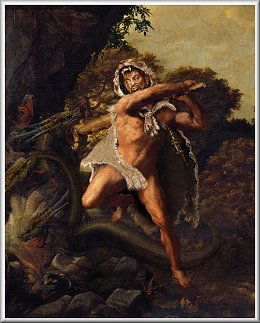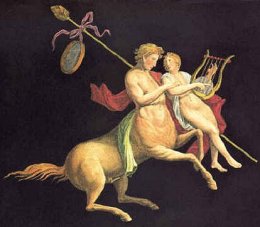
WELCOME MYTHMANIACS
TO THE MYTH OF THE MONTH



MARCH MYTH OF THE MONTH
HERCULES -- PART ONE
THE GREATEST HERO THAT EVER LIVED

CHAPTER 4 - EARLY YEARS & EDUCATION
CONTINUED FROM PAGES ONE, TWO & THREE
Amphitryon taught his step-son the finer points of chariot driving, showing Herc how to round corners without grazing the markers or tipping over. You should have seen the cocky youth, once he got the hang of it, screeching at full speed around the corners, his chariot often precariously balancing on one wheel, as he leaned mightily to keep it from crashing!
Drove his poor mother Alcmene into hysterics every time!
"At least put on your helmet and seatbelt!" she would scream.
From Castor, Herc received fencing lessons, was taught the use of weapons, cavalry and infantry tactics, and was introduced to the rudiments of battle strategy.
His boxing teacher was one of Hermes' sons, either Autolycus or Harpalycus. Talk about tough! Harpolycus looked so grim and deadly when fighting that none dared face him! He could knock out his opponents simply by glowering at them! No wonder Herc never had a problem kicking butt! Just look at his tutors!
Eurytus taught him archery, or perhaps one of Amphitryon's herdsmen, the Scythian Teutarus. Even Apollo got involved, just to make sure Heracles got nothing but the finest instruction.
Soon Herc surpassed all other archers ever born, becoming even better than his companion Alcon, who was father of Phalerus the Argonaut, and who had a most unnerving practice method.
You see, to hone his skill, Alcon would align a bunch of his soldiers in a straight line and set a succession of rings on their helmets. He then would shoot his arrow through the rings, as his soldiers stood motionless and tried to control their bowels, hoping above all that Alcon wasn't paying homage to Dionysus the previous evening...
Once, the son of Alcon was attacked by a serpent, which wound its coils about him and was suffocating the boy. Alcon coolly took out an arrow and shot with such skill as to mortally wound the snake, without hurting a hair on his son. Eat your heart out William Tell!
Yes, Alcon didn't know how to miss, and he transferred this magic to Hercules. One night the three of us cruised down to one of those traveling carnivals, where the huckster Centaurs try to fleece your drachmas by having you shoot an arrow from a great distance through this impossibly small target.
Ha! Let's just say the boys cleaned up! The carnies hastily broke camp and left town before dawn, their tails between their legs, having completely run out of stuffed toy Minotaurs, Chimeras, Griffins and Medusas.
The boys donated the toys to the Special Olympics. The grateful Greeks in Herc's honor held a foot race and called it the Olympic Games. They had such a blast that they decided to do it every four years. The rest is athletic history most glorious, today's O.O.C. notwithstanding...
It's unclear who taught Heracles astronomy and philosophy, but he was well versed in both subjects. As educated and worldly as he was, however, the son of Zeus remained the embodiment of physical strength, as opposed to mental. Only the Celts honored him as the patron of letters and the bardic arts.
Eumolpus taught Herc how to play the lyre and sing, and the handsome youth Linus, son of the River-god Ismenius, turned him on to books and the wonders found therein. One day, however, Eumolpus was away and Linus was substituting as Herc's lyre teacher.
Linus kept trying to get Heracles to change his playing style, but Herc was loyal to Eumolpus, and refused to comply. Linus proceeded to brutally beat Herc for his stubbornness. Bad, bad move, and had Linus lived, he would have regretted it.
After tolerating a succession of hard blows from Linus without flinching, Hercules finally lost it and, picking up the heavy lyre, struck Linus upside the head, killing him instantly.
Heracles was brought up on murder charges but at his trial astutely quoted a law of Rhadamanthys, one of his judges, which justified forcible resistance to an aggressor.
In other words, "In your famous 'Zeus vs. Python' ruling, you in essence decided that it's perfectly ok to crush your attacker's skull with a medium-sized harp, as long as it's done in self-defense, your Honor."
Hey, you want to get a Supreme Court judge's attention, cite one of their own rulings. Herc got an absolute discharge, with not even a mark on his record.
Ever after, the killing of Linus was interpreted by the spin doctors as "an attack against tyranny." Still, Amphitryon now was concerned that the boy might commit further violent crimes and sent him away to a cattle ranch until his eighteenth birthday.
Here Herc was a man among boys, outstripping his contemporaries in height, strength and courage. Apollodorus liked telling how Heracles's eyes flashed fire, and he had an unerring aim, both with javelin and arrow. He ate sparingly at noon; for supper his favorite food was roast meat and Doric barley-cakes.
His tunic was short-skirted and neat; and he preferred a night under the stars to one spent indoors. Plutarch explains that Herc's profound knowledge of augury, which is the ability to interpret omens, led him to welcome the appearance of vultures, whenever he was about to undertake a new Labor.
"Vultures," he would say, "are the most righteous of birds: they do not attack even the smallest living creature."
Heracles fashioned his famous club from the New Year tree of ancient Greece, the Wild Olive tree, even bringing a sapling to Olympia from the land of the Hyperboreans.
I never knew Hercules to pick a quarrel or start a fight, but he always gave aggressors tit for tat. He subscribed to the Cyclopes theory, "an eye for an eye," and all that...
But only fools dared come on to Herc! One such chump, named Termerus, used to kill travelers by challenging them to a head-butting match. Thick-skulled Termerus had the temerity to insist that he and Heracles have a go.
That's using your head. Like Hesiod would say, "Now there's a prime candidate for natural deselection. If Termerus were any more stupid, we'd have to water him twice a week."
Heracles obliged Termerus. Faster than you can say "Termerus terminatus," the big lug lay dead, his head crushed like an egg, with nary a bump to mar Herc's fair cranium.
I'm here to tell you, however, that Hercules was naturally courteous, well-mannered, and the perfect gentleman.
Except for the time he murdered his wife and kids. But we can blame Hera for that, as we'll see next month.
Hercules Myth of the Month continues in April.
MYTH OF THE MONTH